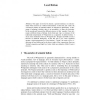Free Online Productivity Tools
i2Speak
i2Symbol
i2OCR
iTex2Img
iWeb2Print
iWeb2Shot
i2Type
iPdf2Split
iPdf2Merge
i2Bopomofo
i2Arabic
i2Style
i2Image
i2PDF
iLatex2Rtf
Sci2ools
124
click to vote
CONTEXT
2001
Springer
2001
Springer
Local Holism
Abstract. This paper is devoted to discuss a general tendency in contextualism which is known as "radical contextualism". In the first part I state the well known paradox of semantic holism, as discussed in philosophy of language: if meaning is holistic there is no possibility to share any meaning. In the second part I present the different answers to this paradox, from atomism to different forms of holism. In the third part I give a criticism of the traditional interpretation of Wittgenstein as a supporter of global holism. I stress some similarities between Wittgenstein's thought and Multi Context theories in artificial inteligence. In the last part I give some argument against a rigid interpretation of "local holism": I claim the need to give restrictions to local holim and to develop a study of the connections between "default" properties and high level rules which are studied in Multi-Context theories. 1 The paradox of semantic holism The work of...
| Added | 28 Jul 2010 |
| Updated | 28 Jul 2010 |
| Type | Conference |
| Year | 2001 |
| Where | CONTEXT |
| Authors | Carlo Penco |
Comments (0)

